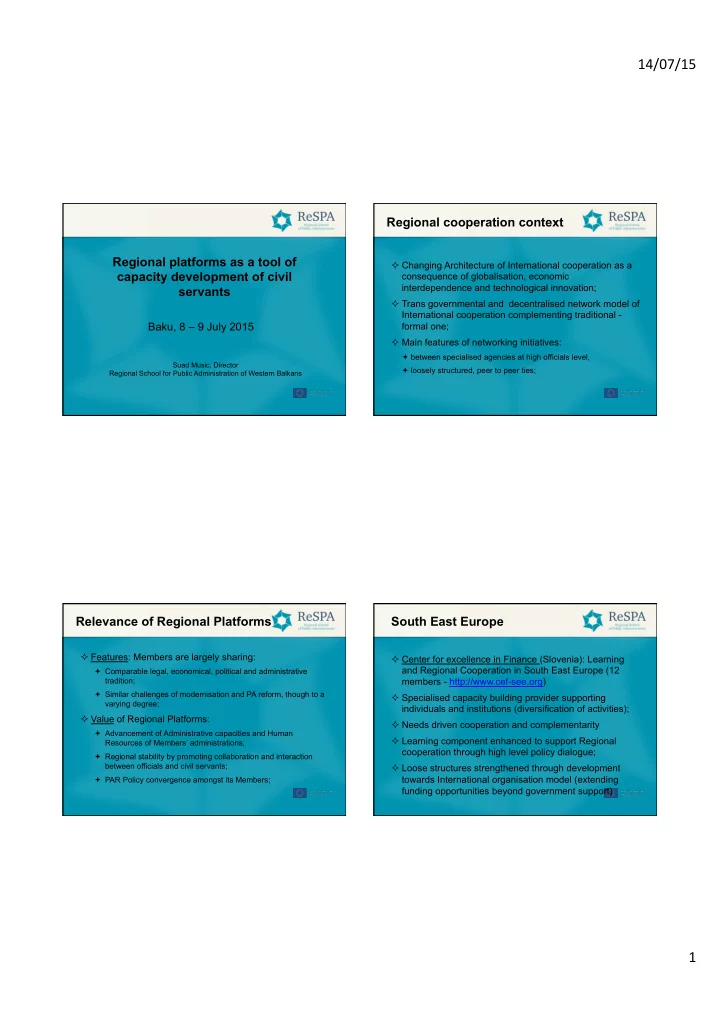

14/07/15 ¡ Regional cooperation context Regional platforms as a tool of ² Changing Architecture of International cooperation as a capacity development of civil consequence of globalisation, economic interdependence and technological innovation; servants ² Trans governmental and decentralised network model of International cooperation complementing traditional - Baku, 8 – 9 July 2015 formal one; ² Main features of networking initiatives: ª between specialised agencies at high officials level, Suad Music, Director ª loosely structured, peer to peer ties; Regional School for Public Administration of Western Balkans Relevance of Regional Platforms South East Europe ² Features: Members are largely sharing: ² Center for excellence in Finance (Slovenia): Learning and Regional Cooperation in South East Europe (12 ª Comparable legal, economical, political and administrative tradition; members - http://www.cef-see.org) ª Similar challenges of modernisation and PA reform, though to a ² Specialised capacity building provider supporting varying degree; individuals and institutions (diversification of activities); ² Value of Regional Platforms: ² Needs driven cooperation and complementarity ª Advancement of Administrative capacities and Human ² Learning component enhanced to support Regional Resources of Members’ administrations; cooperation through high level policy dialogue; ª Regional stability by promoting collaboration and interaction between officials and civil servants; ² Loose structures strengthened through development towards International organisation model (extending ª PAR Policy convergence amongst its Members; funding opportunities beyond government support) 1 ¡
14/07/15 ¡ Western Balkans Challenges ² Regional School for PA – ReSPA (Montenegro): Learning, Devepment and Regional Cooperation in the ² Reliable needs assessment - identification of the Western Balkans ( 5/6 members - http://www.respaweb.eu) common Members’ needs and priorities; ² Structured Regional cooperation at political, managerial ² Coherent capacity building programmes, tailored to the and expert level towards PAR policy convergence beneficiary needs and complementing Members’ towards EAS (European Administrative Space); objectives and actions on mid term basis; ² Needs driven cooperation and complementarity to ² Sustainable funding national goals; ² Planning and Assessing value created from the Regional ² Flexibility and diversity of activities to address common Platforms’ activities on capacity building; challenges of institutions and individual civil servants; ² Joint funding from its Members and EU influences modus operandi Creating value of social learning *Promoting and assessing value creation in communities and networks: a conceptual framework. Wenger, E., Trayner, B., and de Laat, M. (2011); ² Value creation in networking or communities (of practice) is value of learning and development enabled by network (sharing of information, learning from each other experience, creating knowledge together, stimulating change etc.); ² Value of the Regional networking is much determined by the complementarity feature of its activities; ² Regional platforms need not just to assess but also to plan and sustain learning and development through its activities; ² Some CONCEPTUAL FRAMEWORKS have been developed and applied already 2 ¡
14/07/15 ¡ Concluding remarks ² National capacity building actions and efforts in Civil service might be enhanced when complemented with learning and development through Regional Platforms on Thank you for your similar or comparable challenges and might be cost effective as well; attention! ² Benefits of Regional Platforms can clearly contribute to the wider cooperation, reconciliation or political stability objectives and might be observed at: ª Individual level (professional and personal networking increasing tolerance, respect, inclusiveness and diversity values); s.music@respaweb.eu ª Institutional level through increased bilateral and multilateral cooperation mechanisms; ª Members’ administration level through convergence of its PAR policy towards recognised standards 3 ¡
Recommend
More recommend